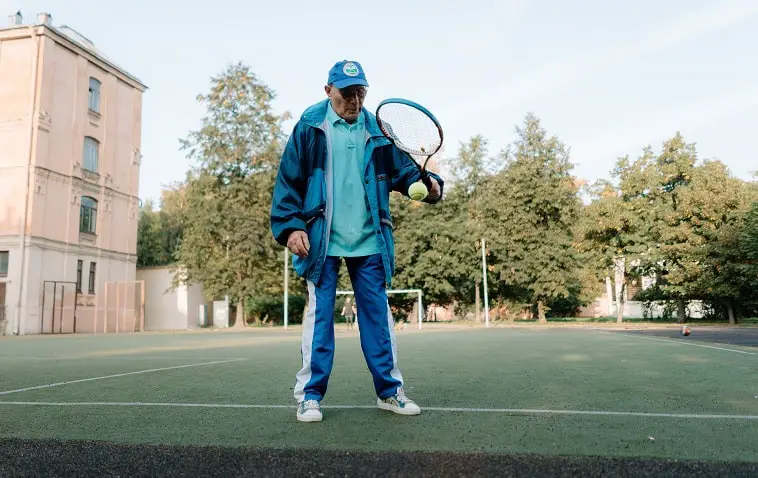According to various studies, the average age of retirement for a tennis player is less than 30, which is far lower than that in many sports. So why is it that tennis players retire at that young an age? We take a look at this issue in this article.
In more recent times, more and more tennis players are playing far longer than they used to, thereby increasing the average age but even then it compares less favorably with other sports. Although there is an increase in the age number it is quite low compared to players in other fields.
Tennis players get into this sport knowing theirs would be a shorter career than most other sports.
Some of the top tennis players used to retire at the peak of their careers, as they deem it the best time to leave a legacy behind – like in the case with Pete Sampras who retired at 32 despite having won the US Open titles just days before his retirement.
The lesser-known players carry on playing in a bid to earn their living – and that age has improved with time too – but even then, the average retirement age of tennis players hasn’t shot up drastically. Which begs the question…
Table of Content
Why Do Tennis Players Retire Early?
Severe Physical Injuries
While playing, tennis players are predisposed to get injured during their career.
Once they get injured on court, the players have to take a break from playing to help them heal. This transition from being home and doing nothing due to the injuries causes the body to lose a bit of its muscle memory.
When the tennis players finally heal and go back into the game, the body creates resistance, and the possibility of worsening results on court becomes a reality.
Some tennis players do not completely heal after they suffer from an injury.
They are advised that returning to the court might render them incapable of keeping up with their surroundings.
Some tennis players are advised not to step foot on the court because it could compromise their overall health and cause long-term fitness issues.
After considering the health risks associated with returning to the field, most tennis players cut their professional careers and decide to retire given the reward-risk ratio is far too low.
Mental Capacity and Concentration
Most players have been exposed to the court at an age as early as five years old and dragged along for almost two decades. It’s a sport where most players start very early.
Having to give all that one has all this time to the game mentally drains a lot of these players a lot quicker than happens in other sports.
Playing tennis requires the players to mentally get involved in the game and keep their heads in it. Players then tend to feel like they have nothing more to give and lose interest in being involved in the game.
Mental health issues is a genuine concern in the society but in an individual sport that could get very lonely while travelling alone on road – especially for players who do not have a big support staff – things could get trickier.
Famous women’s tennis player Naomi Osaka has raised concerns about these issues in recent times but even before that there have been players – top ones at that – who have battled these issues.
Petra Kvitova needed to take a break for a few months because she felt she was mentally spent at the start of the season itself in 2015. As tough as it was for her, Kvitova had all the support she needed given she is one of the top players in the world but take the example of someone like Cliff Richey, a former American Davis Cupper.
Richey had reached the semifinal stage at both French Open and US Open and was a Wimbledon quarterfinalist but suffered clinical depression for which he needed medication.
He went on to write a book called “Acing Depression, A Tennis Champion’s Toughest Match,” which, as the name suggests spoke about his life overcoming mental health issues.
Also Read:
Drug Abuse
Some players tend to get depressed and turn to alcohol and drug abuse.
During the depressive state, they result to substance abuse to cope due to the loneliness and preparation for the next matches. With time, the drugs reduce the body’s ability to keep fit, and the tennis players quit the game for the body to rejuvenate.
Quickly Diminishing Physical Capabilities
Tennis requires a lot of intense movements around the court.
There are less than twenty minutes between games for about two hours every game to rest and reset during a match. Most tennis players’ bodies cannot handle intensive movements, especially during games, and most prefer to leave the competitive world of tennis.
Pressure on Their Legs
Playing tennis requires people to be on their feet for long periods of time.
Footwork is essential to maintain your balance and composure during a game. For tennis players to survive on a court, they should be able to handle the intensive pressure they put on their feet.
This becomes a cause of a lot of fitness issues related to the legs, feet, ankles, shins, Achilles Heel among others, causing tennis players to take that early call.
Straining on the Court
A tennis match could be over in an hour and a half at times but there are other occasions when it could go on for even three hours or more (hey, the longest singles match lasted more than 11 hours!).
Add to that, a tennis season lasts for about 45 playing weeks. It requires players to be fit and last for the entire season.
To survive a whole season, a tennis player should be in good shape as the tournaments require them to go through vigorous training as they continue taking part in the games.
As the players age, most of them cannot keep up the effort and lose the ability to play and stay around for the games until completion. Over time the players consider leaving the game, and some result in coaching other players or retiring from the game altogether.
Also Read:
Stop Enjoying the Game
People start playing tennis at a young age for the love of the sport, but all that changes from being a fun activity to a career path.
These dynamic changes from being just a hobby to a profession that tennis players need to nurture do change things around for such players. The players need to put in the time and effort to practice and get involved in the game is a scope they had not anticipated would take a toll on their personal lives.
Over time, the players stop enjoying the previously thoroughly enjoyed game. They tend to focus on results and tournament wins and financial returns and lose sight of why they set out to play tennis at a professional level.
The morale of the tennis players could gradually decrease as a result, leading to the ceasing of enjoying the sport for fun.
Aging
Tennis is a game that mainly relies on power from the body.
Your body cannot use oxygen effectively, and you tend to lose air during an encounter. It automatically makes you less efficient on the court than your opponents.
As people get old, the body naturally succumbs to the pressure.
Although some players exercise more during this time, it puts them at a high risk of getting opportunistic conditions such as neck pain, kneecap injuries, and back pain.
Financial Instability
For tennis players to be able to go and tour around the world for tournaments, they require colossal funding that would help in procuring materials and paying for both travel and accommodation.
The tennis players get these funds from brands that want to affiliate themselves with the player. However, not a lot of players can acquire such funding.
Most of these players have to facilitate their plays from their own pockets, making them wallow in debt and strain their financial capabilities.
Over time they find that the only remedy is to quit and focus on getting themselves financially stable rather than waste their most productive years on the field.
Bullying
There is a fine line between banter and bullying when talking about players.
When someone comes out and openly starts playing tennis as a professional player, they are open to public scrutiny. Even the slightest thing they do is placed under a microscope and analyzed.
It does not bode well with most players as they make headlines on minor things. It makes going to the court harder each time, and eventually, the players decide to retire early and live a normal life instead.
Final Words on Tennis Players Retiring Young
A lot of talent is lost when tennis players feel like they have nothing more to give on the court.
Overcoming the fine line of disparity would save many people’s careers and put them on a pedestal.
Most people believe they can create a legacy and leave the game in their prime time so that they do not ruin what they had already created. However, players like Roger Federer and Serena Williams have proven this theory wrong.
They have been able to hold their fort since they officially started playing the sport.
They have kept us at the edge of our seats during their matches even after passing the age of 35.
However they have been exceptions to the norm rather than the norm itself, and while things are changing with time and with better medicine, tennis players still retire far earlier than most other sportspersons.


